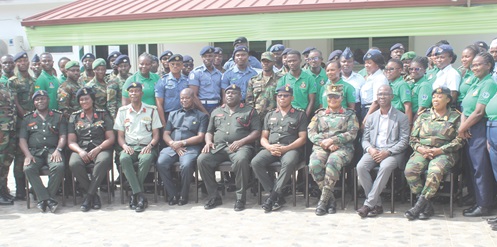
4th Batch of Military Emergency Medical Technicians under training
Training of the fourth batch of the Military Emergency Medical Technicians (MEMTs) under a programme of the National Ambulance Service has begun in Accra.
The military has presented 70 personnel to undertake the programme which is aimed at boosting its medical response unit.
They consist of 43 soldiers, 19 defence civilian staff of the Ghana Armed Forces (GAF) and eight civilians.
They will undergo a 12-month training module of classroom work, hospital attachment and ambulance station schedules before their final assessment and passing out.
The MEMT programme, being run in collaboration with the Ghana Armed Forces, aims at improving health care within the GAF medical structure and the country at large.
Robust Medical Service
The Chief Executive Officer of the National Ambulance Service, Professor Ahmed Nuhu Zakariah, said a robust emergency medical service system was needed to bridge the gap between the health system in the hospitals and the pre-hospital system, and urged security agencies to embrace the initiative.
He further urged the facilitators to impart the right knowledge and skills to participants to enable them to respond to emergencies.
Prof. Zakariah encouraged participants to take the training seriously, saying “this training would help you have two professions at the end of your career.
One as a military officer, which you'll be retiring from, and one as an emergency medical technician that would help establish a private emergency medical services”.
He expressed the hope that in the future participants would establish their own private emergency medical technician services to support the state to provide the emergency response to everybody in the country.
Prof. Zakariah called for an improved and enhanced emergency medical services system, pre- and out of hospital emergency care services.
He expressed the hope that the country would acquire and learn best practices and skills from abroad to develop its own system.
Significant
The Director of Nursing Services of the Ghana Armed Forces Medical Service (GAFMS), Col. Rex Adzagba, said since its establishment following the May 9 Stadium Disaster in 2001, the MEMT had become part of staff requirements for medical facilities across the country and beyond, adding that “MEMT has manned the Emergency Response Unit of the 37 Military Hospital”.
EMTS, he said, would provide intra hospital transport of patients, conduct medical evacuations and medical support duties during state and military functions.
He therefore cautioned the trainees against idleness and indiscipline, saying “Your conduct and personality will form part of your assessment to determine your suitability for deployment as a MEMT.
Involvement
The Deputy Director-General of GAFMS, Col. Gordon Appiah, said MEMTs’ involvement in casualty evacuation and patient transport had reduced fatalities, promoted early recovery, minimised complications and promoted patients comfort.
“As we all look forward to the day patients are no longer transported in private vehicles and taxis to and fro for healthcare but appropriately and with experts handling according to internationally accepted standards you will continue to bridge that gap,”he added.
He entreated the trainees to be serious and committed as there would be no room for mediocrity, saying “nothing short of excellence would be expected from you.
You must be physically, mentally, emotionally and socially fit to embark on your chosen profession.”
Col. Appiah said the training facilitators were ready and willing to impart knowledge and share valuable experiences, therefore urged them to collaborate and give their maximum attention to the facilitators.
